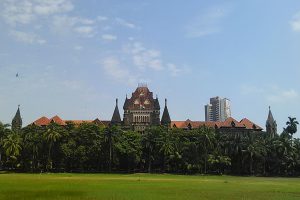Bombay High Court: The Division Bench of S.S. Shinde and Milind N. Jadhav, JJ. allowed an appeal against conviction of the Appellant by the Trial Court. The appellant was convicted of the offence punishable under Section 302 of the Penal Code, 1860, (“IPC”) read with Section 34 IPC. He was sentenced to suffer life imprisonment and to pay a fine of Rs. 15,000.
Background:
The case of the Prosecution was that P.W. 2 received a phone call from a lady called Smt. Chitrangi Chandrakant Shirpurkar a resident of Ranvali Village informing that an unknown person had killed Savitri Sagar Pawar (deceased) by strangulation and her dead body was lying in the jungle area. The offence was registered initially against unknown persons and the body was sent for post-mortem. According to the Prosecution’s case, the accused sought sexual favours from the deceased which she refused. Hence, the Appellant strangulated the deceased with the towel while the Accused 2 held her legs.
Advocate for the appellant submitted that the investigation by the police authorities to unearth the evidence pertaining to the incident was improper and inadequate and that the impugned judgment and order was not only based on faulty investigation conducted by the police authorities but has been passed without appreciating the facts and circumstantial evidence on record, and has been passed based on mere conjectures and surmises.
Findings and Conclusion:
The Court was of the view that the Prosecution had examined six witnesses. The defence had not examined any witness thus the Court outlined the evidence given by each of the prosecution witnesses as the Trial Court judgment was based entirely on the evidence of these witnesses so as to indict and convict the Appellant.
The Court reiterated the observations of Supreme Court in Rama v. State of Rajasthan, (2002) 4 SCC 571 which read,
“4. … It is well settled that in a criminal appeal, a duty is enjoined upon the appellate court to reappraise the evidence itself and it cannot proceed to dispose of the appeal upon appraisal of evidence by the trial court alone especially when the appeal has been already admitted and placed for final hearing. Upholding such a procedure would amount to negation of valuable right of appeal of an accused, which cannot be permitted under law.”
The Court based on the above principle weighed the probative value and sufficiency of the evidence on record. The Court was resultantly of the view that there were serious shortcomings in the Prosecution’s case to prove that the Appellant and the Accused No. 2 killed the deceased. The child witness Laxman Pawar (P.W. 3), who is said to be the sole eyewitness to the incident and upon whose evidence the Prosecution relies highly, is vague, fraught with inconsistencies, has been contradicted by statements of other witnesses, and lacks adequate corroboration. Furthermore, the Inquest Photographs of the deceased throw open a lot of questions in relation to the manner in which the investigation was conducted by the Investigating Officer. As observed by us, the Investigating Officer has not recorded the statements and/or brought forth the relevant parties as prosecution witnesses. Such investigation smacks of complete incompetence and therefore deserves to be reprimanded with strictures.
The Court was not convinced that the evidence on record was sufficient to prove the guilt of the Appellant beyond reasonable doubt under the provisions of Section 302 IPC read with Section 34 IPC as concluded by the Trial Court thus it set aside the impugned judgment and order, reversing the sentence of the Trial Court convicting the Appellant of the offence under Section 302 IPC read with Section 34 IPC.[Ganesh Bhagya Mandavkar v. State of Maharashtra, 2022 SCC OnLine Bom 185, decided on 27-01-2022]
Suchita Shukla, Editorial Assistant has reported this brief.
Mr Aashish Satpute, Advocate for the Appellant (Appointed).
Mr S.S. Hulke, APP for the Respondent – State.

